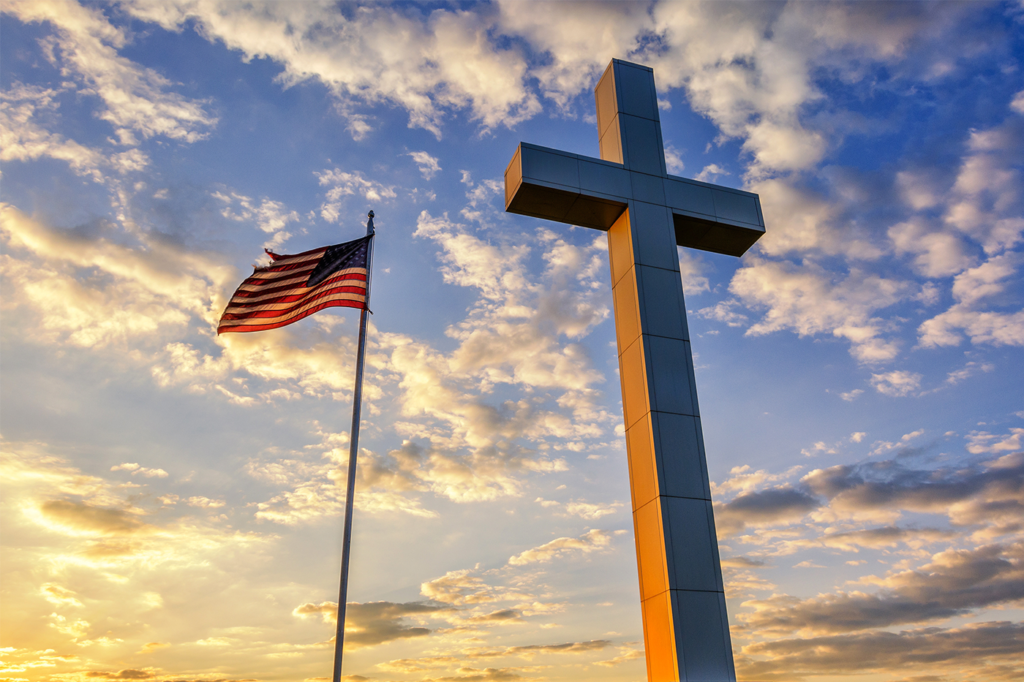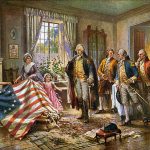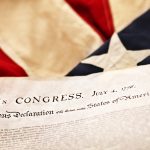One usually writes a new book for one of two reasons: either to treat a topic that no one has covered before; or to correct errors on a topic that others have treated so poorly that someone needs to set the record straight. It was for the second reason that Mark David Hall wrote his new book, Did America Have a Christian Founding?
Hall is no stranger to the study of religion and the American founding. Quite the opposite: he is among America’s foremost experts in the era’s religious and political ideas. In addition to authoring numerous scholarly books and articles in the discipline, he has co-edited a massive collection of documents on religion and church-state relations in early American history.
Unlike Hall’s earlier work, this book is written for a popular audience. Hall has a message—and he wants it to reach as many people as possible—namely, that many scholars and amateur historians have grossly misread or misrepresented the status of religion in early America. The book is a kind of scholarly iconoclasm: it challenges several well-established views, and along with them, established scholars.
Like all effective iconoclasts, Hall employs two kinds of argument.
Start your day with Public Discourse
Sign up and get our daily essays sent straight to your inbox.First, he abundantly cites the opposing view, to demonstrate that he is attacking real claims, not just vague notions of what “some people say.” Every chapter begins with ample quotations from books that have made the erroneous claims that Hall targets. The footnotes list other works that have made similar claims. Hall is not attacking straw men, but claims made by real scholars—claims that are wrong.
Second, he provides detailed, positive evidence in favor of his own view. Indeed, Hall produces almost an overabundance of facts to support his case. He leaves no doubt that he is entirely at home in the primary source record, as well as in the scholarly studies of the field. Almost twenty-five percent of the book is devoted to endnotes. Any honest scholar who wants to dispute a point Hall makes will have to wrestle with the copious amount of material that he has mastered and brought to bear on the subject.
The Arguments
Hall demonstrates that many commonly accepted beliefs about the religion of the American founding are entirely baseless.
Take the notion that “almost all” of the American founders were deists. Ethan Allen was the lone confirmed American deist of any influence in the founding period. Thomas Paine, who spent relatively little time in the United States—and became deeply unpopular in America after writing The Age of Reason—was the era’s other famous deist. Jefferson, Adams, and Franklin were much quieter about their heterodox beliefs, and even they were not dyed-in-the-wool deists. Franklin, for example, often spoke of Providence, and of a God who did in fact intervene in the affairs of men.
Another myth that Hall dismantles is that of the “Godless” Constitution. While the Constitution only mentions God obliquely, it still cannot be understood except as a product of the Christian convictions of its drafters and ratifiers. Hall concludes that “the constitutional order they designed, one characterized by federalism, separation of powers, and checks and balances, reflects their Christian commitments.”
Does the First Amendment owe its origins to James Madison’s “Memorial and Remonstrance,” and to Thomas Jefferson’s Virginia Statute for Religious Freedom? This claim has been repeated by numerous scholars and jurists, but Hall demonstrates that the evidence simply isn’t there. A more honest historical approach must look to the influence of other founders (such as the pious Roger Sherman) and to other fundamental charters (such as the Massachusetts Constitution of 1780). These collectively reflect the prominence of Christianity in American public life.
Hall likewise explores whether the founders believed that the government should promote and encourage religion and morality—and of course the answer is in the affirmative. In addition to the frequently cited “Farewell Address” of George Washington and the Northwest Ordinance’s section on establishing schools, the overwhelming evidence is that the founding generation wanted to encourage religion—and “by ‘religion,’” Hall explains, “the vast majority of [Americans] meant Christianity.”
Finally, Hall argues that the founders supported religious liberty, not because they wanted to separate church and state, but because they were sincere Christians. They wanted religious liberty because of their theological convictions. Disestablishment was good for the purity of the faith, for it did not require the state to make hypocrites of dissenters. Most of the founding generation also came to believe that religious liberty promoted the growth of churches. These arguments can be found everywhere in the founding era, even in Madison’s famous “Memorial and Remonstrance;” and they all illustrate the conviction that “religious liberty causes Christianity to flourish and to be purer.”
Some Tensions and Unanswered Questions
Nevertheless, the book does not answer all the questions we might ask about religion in the founding, and it raises some new ones.
Hall aims at a popular audience, yet his quarrel is with scholars who have misread the past. Why take the scholarly argument to the streets, so to speak? The first reason, and a good one, might be that the sheer volume of errors concerning the topic makes it necessary to promote the truth as widely as possible. But a second reason, suggested more in the tone and texture of the book, is to fight the politicization and polemical uses of the past. Too many writers, even otherwise fine scholars, have misinterpreted religion’s place in the founding in order to score partisan points, and Hall calls them on it. For example, Hall points out that while some historians have (rightly) called for greater contextualization of the past in order to understand it, they have simultaneously misread the language of the founding era. How? By reading it out of context. Hall therefore shows readers the need to handle the evidence of the past judiciously.
But in critiquing so many other historians, he sets a high bar for himself. Does he meet it?
For the most part, he does. However, especially toward the end of the book, Hall’s writing can become very political. Almost half a chapter discusses religious liberty exemptions in contemporary America, naming specific cases and including endnotes that praise the appointments of Neil Gorsuch and Brett Kavanaugh to the Supreme Court. Even though my political views largely overlap with Hall’s, this material strikes me as being out of place. Worse, it makes the author vulnerable to the same criticism that he has made of other scholars: that he may be misinterpreting the founding in order to bolster his own partisan arguments. Is the tail wagging the dog?
This is not the book’s only potential vulnerability. Another is the definition of a “Christian founding” that Hall gives in the introduction. While he asserts that the answer to the question in the book’s title is “a resounding yes,” his actual conclusion is more modest: that the founders were merely “influenced by Christian ideas” (his emphasis). But isn’t that a separate claim? Moreover, the Christian-influence thesis itself raises additional—and hotly debated—questions.
Hall is perfectly clear throughout that the founding generation was overwhelmingly Christian, and predominantly Reformed and Protestant. The evidence for those facts is inescapable. But the argument from those facts to some of his other conclusions—such as the claim that the architecture of the federal government (for example, federalism or the separation of powers) derives from a specifically Protestant and Reformed heritage—is less clearly documented. In fact, among scholars of the American founding, it is one of the more frequently debated claims: What about the influence of Scottish common-sense philosophy?—the common law tradition?—natural rights and social contract theory?—Montesquieu and the French influence? Hall leaves this portion of the book underdeveloped.
A similar difficulty arises in his discussion of the founders’ views on promoting Christianity and morality. Hall produces ample evidence—and leaves his readers in no doubt—that early Americans agreed on the importance of cultivating a moral and Christian people. But why did they think it important? Did the founders want to promote Christianity because it was their duty as civil magistrates to care for the souls of the people? Or did they limit themselves to promoting Christianity for its temporal benefits? The weight of the evidence is almost all for the latter: the founding generation promoted religion and morality in law because they were good for this life. The first reason that the laws of this era give for promoting Christianity is almost always that “the Christian religion tends greatly to make good members of society, as well as good men” (in the words of a Georgia statute). As far as the law was concerned, the consideration of the welfare of souls was secondary.
This fact could call into question the claim that America had a Christian founding. While it remains true that America was founded by Christians, and that American institutions and political ideas were influenced by Christian beliefs, still, the laws and charters of the states were not themselves Christian documents.
An additional difficulty that Hall might have cleared up involves the problem of discussing America in this period as a nation at all, let alone a Christian nation. This topic has been treated before, but too often by historians who mostly ignore the loose nature of early America’s federal structure. The problem that precipitated the Constitutional Convention in 1787 was too much decentralization under the original Articles of Confederation. Even after the Constitution had been ratified, the states remained primary well into the nineteenth century. This predominance of the individual states over the federal government makes it difficult to speak of America at that time as a nation with a single founding. The question of whether that founding was Christian is even more difficult.
Instead we should say, to be more historically precise, that some of the states clearly had a Christian founding, while others did not. The Constitution of Delaware, for example, required all officers in its government to swear an oath that they believed in God the Father, Son, and Holy Ghost, as well as in the inspiration of the Old and New Testaments. That was what a Christian founding in America looked like. Other states had less obviously Christian foundations. The Constitution of the State of New York, for example, required no such oath, even if in other respects it appeared to assume that its citizens shared Protestant beliefs.
Considered on the Whole
Hall’s book is well worth reading. It adduces solid evidence to dispel many myths and correct serious errors. Let us finally be done with false claims that the founders were deists, or that they were hostile to religion and wanted to exclude it from public life. Let us set Jefferson and Madison alongside the dozens and hundreds of other founders whose ideas were more in the mainstream, whose writings were more popular in their time, and who better represent their age. In sifting and disproving these modern fallacies, Hall has done a great service.














